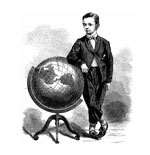
The Wisdom of the World & the Wisdom of God
FIRST THINGS FIRST
The wisdom of the world poses as realism, as the sure way to succeed, prosper, and win. It disguises itself as irrefutable logic and gives the impression of level-headedness. It regards itself as the antidote to quixotic fantasies and naïve religious ideals that do not correspond to the hard truths of the world. Polonius’s famous advice to his son Laertes in Hamlet illustrates one form of this worldly wisdom: “Give thy thoughts no tongue,” “Be thou familiar, but by no means vulgar,” “But do not dull thy palm with entertainment” (hospitality), “Beware of entrance to a quarrel,” “Give every man thy ear but few thy voice,” “Neither a borrower nor lender be.” Polonius’s politic advice consists of precautions against speaking the truth, being generous in the treatment of others, revealing passionate convictions, and forming close relationships. Rather, Polonius encourages his son to be on guard, trust no one, and hide what he thinks. When Polonius advises, “To thine own self be true,” he does not counsel self-knowledge or the courage of conviction, but the rule of self-interest.
Worldly wisdom dictates neutrality or “moderation” — being lukewarm, neither hot nor cold. Life is a chess game, and therefore one must always be more cunning and calculating than the opposition. Exaggerating man’s foreknowledge and discounting the mystery of Divine Providence, worldly wisdom holds that man alone determines the outcome of events. Worldly wisdom, despite all its claims to higher knowledge of the dark secrets that lead to victory, amounts to false prudence, as Polonius’s example testifies.
In The Prince Machiavelli likewise looks to worldly wisdom as the source of political power, arguing that only the appearance of goodness — not real moral integrity — is required for the success of rulers:
It is good to appear merciful, truthful, humane, sincere, and religious; it is good to be so in reality. But you must keep your mind so disposed that, in case of need, you can turn to the exact contrary. This has to be understood: a prince, and especially a new prince, cannot possibly exercise all those virtues for which men are called “good.” To preserve the state, he often has to do things against his word, against charity, against humanity, against religion.
As Machiavelli explains, public image matters more than moral character because “the masses are always impressed by the superficial appearance of things.” Thus, cleverness in deceiving others and artfulness in concealing one’s intentions become the “virtues” instilled by worldly wisdom. Moral absolutes, religious norms, and noble ideals play no part in the way of the world. For Machiavellian politicians, goodness is all form and no substance. Man is the measure of all things, the one who determines right and wrong according to the standards of expediency and utilitarianism. If victory is achieved and the prince gains power, then the end justifies the means. Because Hannibal’s “inhuman cruelty” prevented the rebellion of his forces and Scipio’s “excessive leniency” led to the revolt of his armies in Spain, Machiavelli equates the moral way with naïve folly, and the worldly way with practical wisdom.
The guiles of worldly wisdom continue to lure modern man in many subtle ways. To run for president in the U.S., political expediency dictates that a candidate equivocate in the wily manner recommended by Polonius, or deceive the masses with superficial appearances posing as absolute truth. As Machiavelli would say, it is good to decry abortion, war, and high taxes, but to win elections one may have to abandon moral principles and make concessions to the political lobbies that provide the greatest contributions. Regardless of how extreme, radical, or immoral the positions politicians espouse, they must appear good, moderate, or tolerant to the masses and to the media — that is, politically correct. Thus, Catholic politicians who compromise the moral teachings of the Church about the intrinsic evils of artificial contraception, abortion, embryonic stem-cell research, and same-sex marriage follow the counsel of Polonius and Machiavelli. Guided by the motives of self-interest, safety, security, and re-election, they pronounce no moral convictions and assume the lame, neutral position of “I am personally opposed, but,” or “If I had known then what I know now” — the essence of Polonius’s circumspect advice.
You May Also Enjoy
Reviews of Return of the God Hypothesis... and Pope Peter: Defending the Church’s Most Distinctive Doctrine in a Time of Crisis
The Cult of Diversity at Providence College... A "Climate of Fear" in the Vatican?
Reviews of False Dawn: The United Religions Initiative, Globalism, and the Quest for a One-World Religion... The Narnia: The Life and Imagination of C.S. Lewis... Benedict XVI: The Man Who Was Ratzinger...

